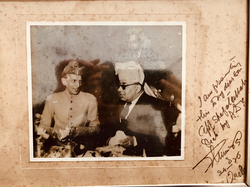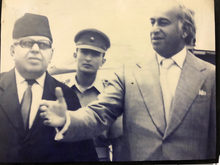Ahmad of Kalat
Khan Mir Sir Ahmad Yar Khan Ahmedzai,GCIE | |
|---|---|
| احمد یار خان احمدزی (Urdu) احمد يارخان احمدزى(Baluchi) | |
 Muhammad Ali Jinnah(left) with Khan (right) | |
| 32ndKhan of Kalat | |
| In office 10 September 1933 – 1979 (aspretenderfrom 14 October 1955) | |
| Preceded by | Mir Mohammad Azam Jan Khan |
| Succeeded by | Mir Suleman Dawood Jan(aspretenderfrom 1979) |
| 5thGovernor of Balochistan | |
| In office 1 January 1974 – 5 July 1977 | |
| Chief Minister | Mohammad Khan Barozai |
| Preceded by | Akbar Khan Bugti |
| Succeeded by | Khuda Bakhsh Marri |
| Personal details | |
| Born | Ahmad Yar Khan Ahmedzai 1902 Khanate of Kalat,British India(present-dayBalochistan,Pakistan) |
| Died | 1979 (aged 77) Kalat,Balochistan,Pakistan |
Mir Ahmad Yar Khan AhmedzaiGCIE(1902–1979), commonly referred to asAhmad Yar Khan,was the lastKhan of Kalat,a princely state in asubsidiary alliancewithBritish Indiaand theDominion of Pakistan,serving from 10 September 1933 to 14 October 1955.[citation needed]
Life
[edit]In the 1920s, Ahmad Yar served as an agent of the British intelligence service, reporting onRussianinfluence and the spread of pro-Marxist sympathy among the poorer Baloch subjects.[1]
He assumed the throne of theKhanate of Kalatin 1933, and was decorated by the British in the1936 New Year Honoursas a Knight Grand Commander of the Most EminentOrder of the Indian Empire(GCIE).[2]
With the withdrawal of the British from theIndian subcontinentin August 1947, theIndian Independence Actprovided that theprincely stateswhich had existed alongside but outsideBritish Indiawere released from all their subsidiary alliances and other treaty obligations to the British, while at the same time the British withdrew from their obligations to defend the states. The rulers were left to decide whether to accede to one of the newly independent states ofIndiaor theDominion of Pakistanor to remain independent outside both.[3]As stated bySardar Patelat a press conference in January 1948, "As you are all aware, on the lapse of Paramountcy every Indian State became a separate independent entity."[4]
Muhammad Ali Jinnahwas Yar Khan's legal adviser in the early 1940s.[5]Jinnah persuaded Yar Khan to agree to accede to Pakistan, but the Khan stalled for time. After a period of negotiations, Khan finally acceded to Pakistan on 27 March 1948.[6][7][8]
Yar Khan’s younger brother, Prince Agha Abdul Karim Baloch, revolted against his decision and took refuge in Afghanistan to wage an armed resistance against Pakistan, with little support from the rest of Balochistan. He finally surrendered to Pakistan in 1950.[9]
On 3 October 1952, as one of theprincely states of Pakistan,Kalat entered into theBaluchistan States Unionwith three neighbouring states,Kharan,Las Bela,andMakran,with Yar Khan at the head of the Union with the title ofKhan-e-Azam.The Khanate came to an end on 14 October 1955, when the Baluchistan States Union was dissolved, Kalat was incorporated into theOne UnitofWest Pakistan,and Yar Khan ceased to rule.[10]
Yar Khan briefly declared himself Khan again in defiance of the Pakistani state from June to October 1958.[11]On 6 October 1958, the Pakistani government arrested and imprisoned him on charges of sedition during the1958 Pakistani coup d'étatagainst PresidentIskander Mirza,but it later released him and briefly restored his title in 1962.[12][13]His arrest triggered an insurgent uprising led byNauroz Khanin 1959.[14]
Legacy
[edit]
Yar Khan's eldest son,Mir Suleman Dawood Jan,assumed the title of Khan of Kalat upon his father's death in 1979. On Dawood Jan's death his son Suleman Daud Jan became the new Khan of Kalat. He has lived in exile in London since the death ofAkbar Bugtiin 2006. Chief MinisterAbdul Malik BalochandSanaullah Zehrihave asked him to return to Pakistan. Yar Khan's younger sons, PrinceMohyuddin Balochand grandson PrinceUmer Daud Khan,are both politicians in Pakistan.[15]
Publications
[edit]- Mir Ahmad Yar Khan Baluch,Inside Baluchistan: A Political Autobiography of Khan-e-Azam Mir Ahmad Yar Khan Baluch, Ex-ruler of Kalat State(Royal Book Company: 1975)ASINB0000E81K7
Further reading
[edit]- Axmann, Martin (2008).Back to the Future: The Khanate of Kalat and the Genesis of Baloch Nationalism, 1915-1955.Oxford University Press.ISBN9780195476453.
- Baloch, Inayatullah (1987).The Problem of "Greater Baluchistan": A Study of Baluch Nationalism.Steiner Verlag Wiesbaden.ISBN9783515049993.
References
[edit]- ^Amin Saikal (2004).Modern Afghanistan: A History of Struggle and Survival.I.B.Tauris. p. 267.
- ^"No. 34238".The London Gazette(Supplement). 31 December 1935. p. 6.
- ^Ishtiaq Ahmed,State, Nation and Ethnicity in Contemporary South Asia(London & New York, 1998), p. 99
- ^R. P. Bhargava,The Chamber of Princes(Northern Book Centre, 1991)p. 313
- ^Farhan Hanif Siddiqi (2012).The Politics of Ethnicity in Pakistan: The Baloch, Sindhi and Mohajir Ethnic Movements.Routledge. pp.56–58.
- ^Yaqoob Khan Bangash (10 May 2015)."The princely India".Archived fromthe originalon 25 December 2015.Retrieved22 December2015.
It was only after a protracted period of negotiations and certain tactics used by the Pakistani bureaucracy, and strange help of All India Radio, that Kalat finally acceded to Pakistan on March 27, 1948.
- ^"In memory of Khan of Kalat".Nation.Retrieved21 October2014.
The Khan announced his affiliation with Pakistan in 1948.
- ^"Balochistan conundrum: Khan of Kalat's return is a distant possibility".Express Tribune.Retrieved26 May2013.
Khan-e-Kalat Mir Ahmed Yar Khan's decision of ceding the princely state of Kalat to Pakistan at the request of Quaid-e-Azam Muhammad Ali Jinnah in 1948.
- ^Qaiser Butt (22 April 2013)."Balochistan Princely Liaisons: The Khan family controls politics in Kalat".The Express Tribune.
Prince Agha Abdul Karim Baloch, father of Irfan Karim and younger brother of Khan-e-Kalat Mir Ahmed Yar Khan, had revolted against his brother's decision of accession of Kalat State to Pakistan at the request of Quaid-e-Azam Muhammad Ali Jinnah in 1948. Abdul Karim took refuge in Afghanistan to wage an armed resistance against Pakistan. However, he ultimately surrendered to Pakistan in 1950
- ^Farhan Hanif Siddiqi,The Politics of Ethnicity in Pakistan: The Baloch, Sindhi and Mohajir Ethnic Movements(Routledge, 2012), pp. 58–62
- ^"Deposed Khan of Kalat restored".Dawn.7 November 2012.
- ^Raṇabīra Samāddāra (2007).The Materiality of Politics: Volume 1: The Technologies of Rule, Volume 1.Anthem Press. p. 38.
- ^James B. Minahan (2002).Encyclopedia of the Stateless Nations: Ethnic and National Groups Around the World A-Z [4 Volumes].ABC-CLIO. p. 258.
- ^Farhan Hanif Siddiqi (2012).The Politics of Ethnicity in Pakistan: The Baloch, Sindhi and Mohajir Ethnic Movements.Routledge. p.71.
- ^"Khan of Kalat being persuaded to return home".Dawn.29 June 2015.
External links
[edit]- Noorani, A. G.(16 January 2009)."The taming of Kalat".Frontline.
- Venkatesh, Karthik (19 February 2017)."A slice of south India in Balochistan".Live Mint.


